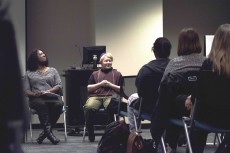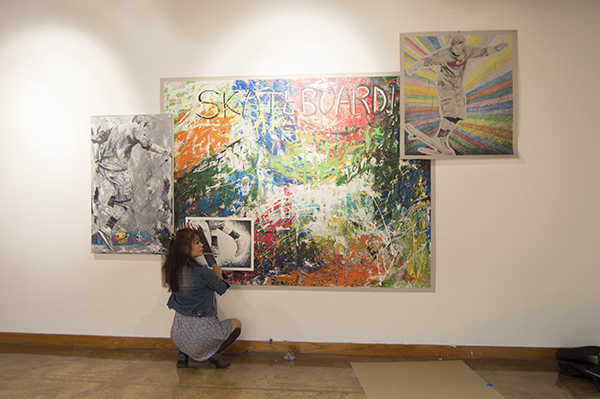By Sarah Young/ reporter
Transgender students can face unique difficulties on college campuses, a South Campus panel said Nov. 23, but students can help.

Sara Brooks/The Collegian
At the event hosted by TCC student organization Spectrum, a panel consisting of counseling director Ticily Medley and transgender students Dimitri Nelson and Charlie Foster discussed challenges faced by non-gender-conforming students.
“You have no clue what’s happening anyways when you get up to a university. You’re absolutely lost,” Nelson said. “And it makes it a lot harder for people if you’re part of a gender or sexual minority … You have to worry about ‘How am I going to traverse this new place?’”
Some unique challenges faced by these students include discrimination by peers, administrative difficulties and even discrimination by professors. These challenges can even affect student success.
“If you have a professor that doesn’t respect your name or your pronouns each time they mention you, it feels kind of like a little bit of a slap in the face,” Nelson said, “like they’re saying, ‘I don’t actually care what you have to say. I was just looking for you to give me the answer that I was looking for.’ So it makes you a lot less willing to speak up, to talk to other classmates … and that gets kind of isolating, and you’re a lot less likely to do well in courses if you don’t feel comfortable there.”
Foster said he has been in this exact position in a composition class where people were not respectful of people’s gender identities. He said the professor instructed people to say discriminatory things about transgender students.
“That hateful environment makes you very uncomfortable,” he said, “and it makes you want to leave and never come back.”
Medley agreed.
“College is hard enough without having to worry about being safe when you come to campus,” she said.
The panel addressed what students and instructors can do to create an inclusive environment at TCC.
“The first step would definitely be, when a student tells you that they are trans and tells you how they identify and what their pronouns are, just use the pronouns,” Nelson said. “That’s the easiest step, and it’s very important.”
A second step, Nelson said, would be to stop any hate going on in the classroom.
“Don’t continue to allow it to happen and encourage it,” he said. “The best way would be to just casually change the subject or to let students know that ‘Hey, we don’t talk that way in here,’ and move on.”
Another thing that colleges can do to be inclusive is to install more single-stall bathrooms.
“It’s a lot easier for people to have those kinds of bathrooms and go into them without feeling more afraid,” Nelson said, “rather than using the downstairs mega-bathroom where everyone stares at you for whatever reason even though it’s meant for you to go to the bathroom and get out.”
Nelson also said he has a “vendetta against Blackboard” for not being able to change his name.
“If you have an online class, then you have to do discussions, and whatever name the school has for you is what’s used on Blackboard,” Nelson said. “It’s incredibly difficult to … put out this legal name that I have that no one uses, and that’s going to put me at risk of people being like ‘Well, this is your real name, so I’m just going to keep using it even though I met you as this other name. I just want to use this one now.’”
The one thing the panel believed people should know is that transgenders are people like anybody else and that it’s OK to ask questions and be accepting.
“Just take a step back and ask, ‘OK, what should I know and how can I understand this?’” Nelson said. “Definitely, asking questions is fine for anybody.”
Medley said discrimination against transgenders is just as wrong as any other discrimination.
“If I knew people weren’t accepting of me just because I was female, or because I was black, or because I was a mother, I would want them to get to know me before making a decision like that,” Medley said. “If you can look at it from that perspective and say, ‘Would I want someone excluding me just because I was this way … or that way …?’ I wouldn’t like that. That wouldn’t feel very good, so why should I do that to someone else?”





























